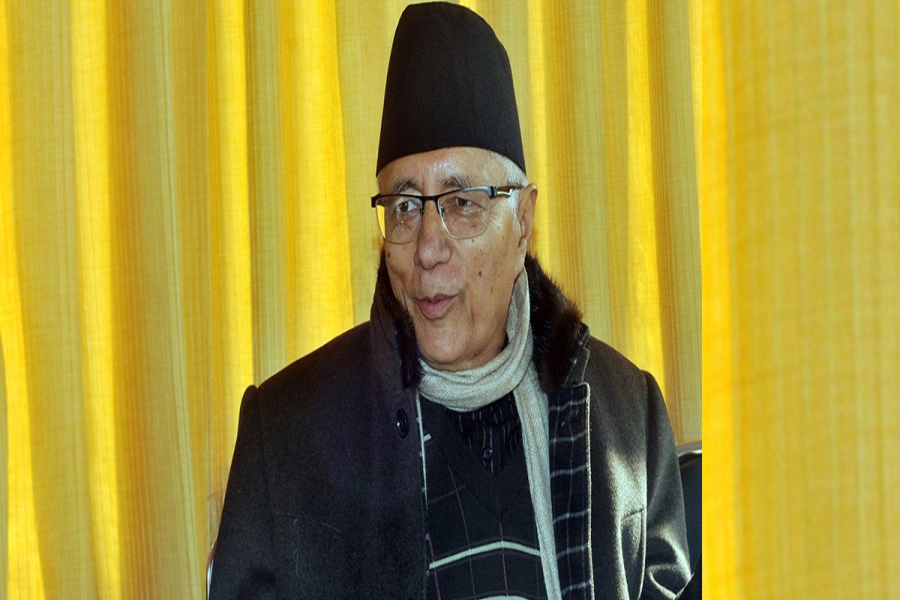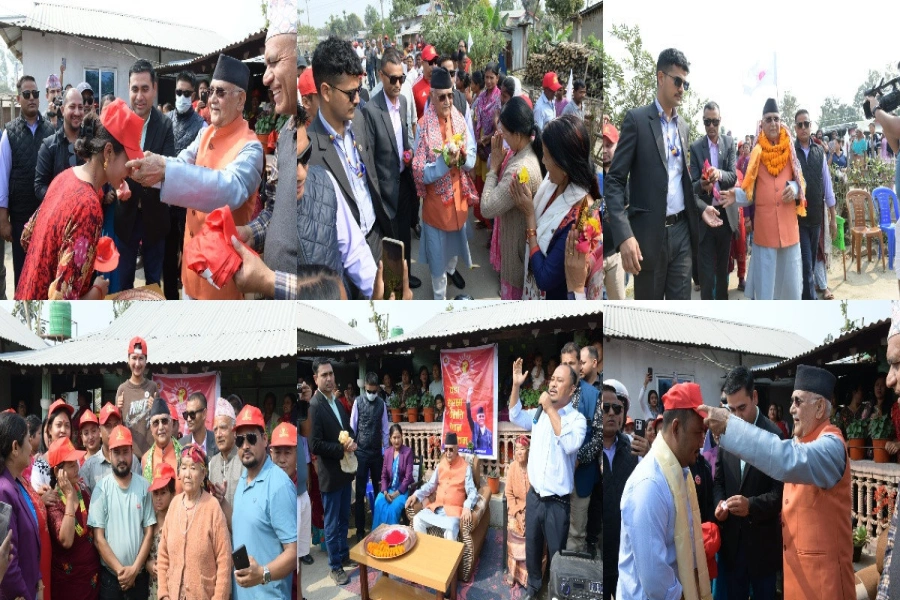KATHMANDU, Jan 14: Nepali Congress (NC) leader Dr. Shekhar Koirala, who is currently on a visit to the UK, delivered statements at the British Parliament (i.e., Westminster) on Monday.
Addressing the event attended by British parliamentarians, including Catherine West, Gareth Thomas, and other distinguished guests, Dr. Koirala said the historic friendship between Nepal and Britain is today marked by strong bilateral relations nurtured by growing people-to-people interactions.
“…I find it hard to believe no British Prime Minister has visited Nepal in 200 years of friendship. In my view, this long-overdue visit would greatly help solidify our historic relationship, sending a good message of Nepal-Britain friendship in the rapidly changing world,” he said.
While appreciating Britain’s understanding of Nepal’s stance on non-alignment in both regional and global contexts, Dr. Koirala urged the British side to resolve the just demands of the Gurkhas without delay, in the spirit of the deep friendship, professional dedication, and personal sacrifices of ex-Gurkhas for British honor.
Dr. Koirala also called for British support to Nepal in combating the adverse impacts of climate change and addressing the substantial trade deficit with Britain. “Despite Nepal benefiting from preferential market access under the UK’s Enhanced Framework Scheme, this persistent trade imbalance underscores the need to enhance the availability of Nepalese goods and services in the British market,” he further said.
Full Text of Dr Koirala’s Statement
Hon. Catherine West,
Hon. Gareth Thomas,
Hon. members of Parliament,
Excellencies,
Ladies
and Gentlemen,
Dear Friends.
NC leader Dr Shekhar Koirala departs for the UK

Good evening and Namaste
At the outset, let me express the cordial greetings and best wishes for the new year 2025 and heartiest congratulations on the impressive victory of the Labour Party in the last general elections. We extend our best wishes for the successful tenure of the Labour Government led by Rt. Hon'ble Sir Keir Starmer.
I feel privileged and honored to be here to interact on the historic and dynamic friendship between Nepal and the United Kingdom. I am deeply touched by the warm reception and the opportunity to exchange views on our shared journey spanning over two centuries.
Your presence is a testament to our friendship.
Ladies and Gentlemen,
Two centuries ago, British Prime Minister Lord Palmerston famously remarked,"nations have no permanent friends or enemies, only interests." Common interests have brought Nepal and Britain together. We regard our excellent and enduring friendship with Britain as being in our permanent national interest. That is perhaps why our ancestors went to wars on the side of the British and so many of our sons made the ultimate sacrifice. Even today, we continue to uphold and stand by shared and common interests.
This historic friendship is today marked by strong bilateral relations nurtured by growing people-to-people interactions. In the spirit of this enduring friendship, on behalf of the Nepali people and their sovereign Parliament, I wish to convey my heartfelt gratitude to the British Government for its continued support to Nepal. I also extend my deepest appreciation to the British people, their political parties, leaders and the British Parliament for their goodwill and respect to Nepal and the Nepali people.
Dear Friends,
The distinguished service of the Gurkhas in the British Army has been central to our bicentennial diplomatic journey. Irrespective of changes over 200 years, our relations have stood the test of time, with people-to-people connections at the core. Over 200,000 Gurkhas fought in the two World Wars, with tens of thousands sacrificing their lives for the British honour there and elsewhere. I am happy that their dedication and sacrifice have been recognized.
The 1923 Treaty of Peace and Friendship with Britain's formal recognition of Nepali sovereignty ushered in a new era, enabling Nepal to diversify diplomatic relations globally. We are deeply grateful to the UK for its early recognition of Nepal as an independent country. Today, Nepal maintains diplomatic relations with 182 out of the 193 member states of the United Nations.
Over the years we have built a relationship that is multidimensional and mutually beneficial, characterized by cordiality, trust, and respect. Britain is Nepal's one of the largest development partners significantly contributing to Nepal's socio-economic transformation. I come from the east of Nepal where some of the earliest British aid was instrumental in building basic infrastructure and connectivity.
Britain's unwavering support during various crises has further cemented her role as a true friend. As a medical doctor and political worker active in the relief works, I have witnessed firsthand the critical role played by British specialists after the devastating 2015 earthquake as well as the importance of ventilators and vaccines, provided during the COVID-19 pandemic. Such support generates immense goodwill towards the British people and government.
Ladies and Gentlemen,
With its vast potential in hydropower, tourism and agroforestry, combined with an honest and hardworking workforce, Nepal possesses immense opportunities for foreign investment. The government has implemented liberalized policies and created an enabling environment for foreign investment. While current cumulative British FDI in Nepal is noteworthy, there remains substantial room for growth.
Nepal's strategic location between the world's two fastest growing economies and largest markets both extending quota and tariff free market access to a wide range of Nepali products, combined with the British edge in science and technology provides tremendous potential for British-Nepal joint ventures across various sectors. I urge you to further encourage British investment in areas such as clean energy, tourism, hydropower, agroforestry and technology among others.
Britain is one of Nepal's top trading partners. However, recent data indicates a substantial trade deficit. Despite Nepal benefiting from preferential market access under the UK's Enhanced Framework Scheme, this persistent trade imbalance underscores the need to enhance the availability of Nepali goods and services in the British market.
Allow me to say a few words about the Nepali diaspora here in the UK. Those working as doctors, nurses, lawyers, pilots, engineers, accountants and in the catering and hospitality industries, contribute to the vibrant British economy and society. It is gratifying to note that an increasing number of Nepalis are also seen participating in the UK's political, including electoral process. Also, thanks to the constant efforts put in by the Britain-Nepal Society here and Nepal-Britain Society in Nepal.
Sister city relations between cities in Nepal and the UK are fostering closer ties between our peoples. The prestigious Chevening scholarship program and its alumni further enhance people-to-people connections. These developments highlight how our bilateral relationship has been significantly diversified, deeply enriched and mutually beneficial. Exchange of high-level State and official visits, professional and business delegations have been instrumental in strengthening relations, fostering mutual trust, and enhancing fruitful cooperation. Parliamentary delegations are particularly valuable in our multidimensional relations.
Respected Friends,
As you know, Lord Buddha, the universal messenger of peace, was born in Lumbini, Nepal. Similarly, Britain is hailed as the birthplace of Parliamentary Democracy. Their values bind our nations together.
I was born into a family deeply engaged in the democratic awakening of Nepal. Since the 1940s, Nepal has endured a tumultuous journey marked by both triumphs and traumas, navigating a series of political transitions, including a painful and protracted internal conflict.
Throughout these transformations, the Nepali Congress played a pivotal role, particularly in steering the violent Maoist insurgency toward peaceful constitutional and political competition for power. Yet, our struggle continues. We are still working to heal the wounds and wipe away the tears of those most affected by past injustices and the scars of recent violence.
Recently, Nepal's House of Representatives passed the Transitional Justice Bill, for the Investigation, Truth and Reconciliation Commission (Third) Amendment Bill. This, I hope, will enable us to end the political transition and fulfill the promise of a sovereign, democratic, peaceful and prosperous Nepal, through improved governance. Nepal will continue to look to Britain for goodwill and understanding as we strive to strengthen democratic norms and institutions.
We firmly believe that democracy is indispensable for development. We are strengthening grassroot democratic institutions through our federal structure to align with people's aspirations, and take the governance closer to the people. However, democracy without meaningful development holds little value.
For us, democracy, development, and effective delivery are mutually reinforcing. This is all the more important for a new democracy like us.
Today, democracy faces the challenges of the rise of populist politics, extreme nationalism, communalism and economic nationalism which we believe also undermine the spirit of multilateralism. BP Koirala foresaw this in the 1970s and warned, I quote, "If democracy has to be saved, we cannot afford to give in to populism." His words remain prophetic today.
As a proud representative of the Nepali Congress, - the premier democratic socialist political party in Nepal, I wish to express my special appreciation to the British Labour Party for its solidarity with our founding leader, B.P. Koirala, during some of our most challenging times including his imprisonment, exile and struggle to restore democracy. To recall with pleasure that B.P. attended the Labour Party Conference held in Blackpool in 1970. With this history of solidarity, mutual understanding, goodwill and support, I extend, on behalf of the Nepali Congress and on my own behalf, our sincere gratitude to the leaders of the Labour Party for standing with us and the people of Nepal in the past.
We look forward to continued fraternity in the days ahead. Having made these remarks, let me conclude with following reflections:
1. In the post-Cold War world, the global political, economic and strategic focus is shifting to the Indo-Pacific and South Asia as an epicenter. With growing mobility, people of South Asian origin are playing increasingly significant roles in professional and public life globally I see the increasing engagement of Nepali diaspora in British professional and public life profoundly and positively contributing in strengthening Nepal - UK relations us well as supporting our ongoing endeavour to institutionalize democracy and human rights in Nepal.
2. As a landlocked and least-developed country, Nepal faces unique vulnerabilities. Climate change is significantly impacting Nepal's Himalayan ecosystems, without it contributing minimally to the climate crisis. Our British friends can play a vital role in supporting Nepal's legitimate demands for climate justice from the international community, particularly in securing financing for our mitigation needs.
3. Maintaining an excellent relationship with our two increasingly powerful neighbors is not merely a geopolitical necessity but a cornerstone of our carefully crafted foreign policy. As Nepal's oldest diplomatic friend and a major Western power, Britain's understanding of Nepal's stance on non-alignment in both regional and global contexts will be vital.
4. As I mentioned, service of the Gurkhas is central to our long-standing relations. I understand a bilateral committee is looking at some of their grievances. In the spirit of our deep friendship, and the professional dedication and personal sacrifices of the Ex-Gurkhas for the British honour, I urge the committee to resolve the just demands of the Gurkhas without delay.
5.Finally, I find it hard to believe, no British Prime Minister has visited Nepal in 200 years of our friendship. In my view, this long overdue visit would greatly help solidify our historic relationship sending a good message of Nepal Britain friendship in the rapidly changing world.
Linked through the shared experiences of history and common aspirations of our peoples in changing times, Nepal-Britain relations remain as relevant and strong today as they have been historically. Democracy, human rights, pluralism and people-centered good governance are common aspirations of our people, commitment of our parties and governments. Sustaining these values in their finest traditions is the surest way to build a towering new architecture on the foundation of our historic ties. In this endeavour, I welcome this opportunity for our conversations today and hope to continue in such meaningful dialogues here in London and in Kathmandu.
Thank you, for your kind attention.
Long live Nepal-Britain friendship.



























-1200x560-1771928761.webp)









